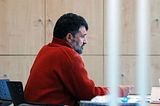-
Down there I sell whiskey and cards. All you can buy up these stairs is a bullet in the head.
Vienna (Joan Crawford) in Nicholas Ray’s Johnny Guitar

BULLET IN THE HEAD (Spain)
When someone says that a movie is boring, to me that means that she didn't find enough in the film to keep her interested. In other words, boredom is in the mind of the beholder. There are exceptions. Warhol's 5-hour Sleep and his 8-hour Empire are well…boring. For most of it’s 85-minute duration, Bullet in the Head is boring. In the pre-credits sequence, a guy puts in motion an impossibly elaborate contraption that culminates with a gun firing a bullet into his head. One wonders if writer/director Jaime Rosales has dispensed with the expectation raised by the title of his third feature. The scene is designed to make us wonder whether or not the remainder of the film will include another act of violence. Bullet in the Head is boring because only the ambient sounds are audible, not the dialogues. It's also boring because, for over an hour, we observe a portly middle-aged guy engage in normal, quotidian activities. At the park, for instance, he talks with a woman and plays with a little boy. We never find out if she is his wife, or sister, or friend. When he initiates sex inside a woman’s apartment or engages another guy in conversation at a bar, all the context that dialogue could provide is absent. The rhythm of the editing, the typical placement of the camera behind windows and physical barriers and far from the subject, and signs and ads suggesting a geographical location somewhere near the border between Spain and France create some interest. Not enough interest, until the final 15 minutes, when the camera gets closer to our anonymous protagonist and his two associates at a restaurant. Using a classic shot/reverse shot sequence, Rosales changes the visual strategy to create an ominous mood. The looks exchanged between the trio sitting at a table and two men sitting on stools at the counter announce that something significant is about to happen.
Bullet in the Head is inspired by the December 2007 killing of two unarmed Civil guards on surveillance duty by members of the Basque separatist group ETA. But this is ultimately of no consequence. What Rosales conveys with tremendous authority and deep conviction is that there is no valid excuse, no valid cause, no valid explanation and nothing to understand about such an event. The psychological profile and political ideology of the killer(s) is irrelevant. You or me can perpetrate an act of violence and find a way to rationalize it. It would be wrong no matter what trauma we experienced in our childhood and no matter how strongly we believe violence is a necessary means to further our political viewpoint. To give the viewer clues as to who this killer is and what he stands for by means of characterization, dialogue and plot would be counter to film's unwavering moral position. Rosales refuses to use violence as a means of entertainment and diversion. He delivers a deeply resonant, rigorous anti-thriller.
There are many films that have an effect on us only while the projector is running and then dissipate from our consciousness. Bullet in the Head is that rare film that is perhaps boring throughout most of its duration but has the potential to inform our lives and remain indelibly etched on our minds long after we've left the theater.
 Posting Permissions
Posting Permissions
- You may not post new threads
- You may not post replies
- You may not post attachments
- You may not edit your posts
-
Forum Rules





 Reply With Quote
Reply With Quote
Bookmarks